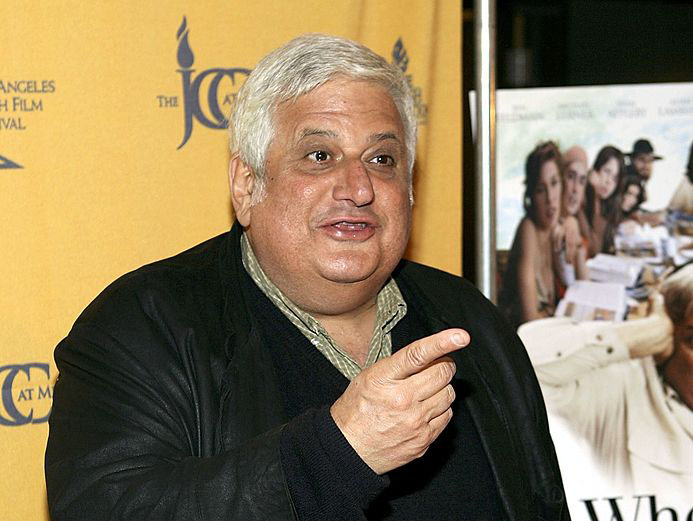 People watch the Israeli Air Force planes fly in formation over the Mediterranean Sea on May 2. Photo by Ammar Awad/Reuters
People watch the Israeli Air Force planes fly in formation over the Mediterranean Sea on May 2. Photo by Ammar Awad/Reuters What does it mean to be American? Or French? Or British? Is it just me, or is this question asked more about Israelis than anyone else? Well, what does it mean to be Israeli? Do you have to be born here, to live here, to have certain beliefs or characteristics, to be a citizen, to identify with the vision of the state (if it even has such thing), to be Jewish? to support Zionism?
This week, Israel turns 72. And if you want to know how young this is, consider the fact that when the US was about this age it signed the Treaty of Guadalupe Hidalgo that ended the Mexican-American War and concluded the process of acquiring Texas, California, New Mexico and Arizona (for $15 million). In other words — and this is not an attempt to make a statement in support of Israeli annexation of territory — the America of 1848 did not feel obligated to make do with a smaller America or dread the prospect of annexing more land.
The America of 1848 was not the America of 2020. The Israel of 2020 is not the Israel of some distant future (2222?). It is also not the Israel of a less distant past. When Israel was born, in 1948, its population was small, its economy fragile, its military more a militia than a real army, its leaders Ashkenazi, European, Socialist. Israelis aimed to be the new Jews. And in many ways, they succeeded, but not necessarily in the manner it intended. I dedicated a large portion of the last three years investing in the character of this new Jew. I still dedicate time to study the nature of Israeli-ness.
For two years my colleagues and I asked a representative sample of Israelis (Jews and non Jews) to agree or disagree with a string of statements concerning Israeli-ness including: Does one has to serve in the Israel Defense Forces (IDF) to be “a real Israeli”?
Consider this: About half of all Israelis do not serve in the IDF. That includes Arab Israelis (about a quarter of the population), most Haredi Israelis, and most religious women, and then some people with disabilities, psychological problems, radical politics, conscientious objectors and more. Are they not “real Israelis”? In the technical sense, of course they are. In the cultural sense, maybe not as much. A shared national identity helps define the boundaries of a society. If one considers the IDF a meaningful feature of national identity, then it’s possible to argue that serving in the military gives one an extra point of Israeli-ness.
In Israel, Memorial Day is on the day before Independence Day. One day we mourn our fallen soldiers, and the next we celebrate the cause for which they made the ultimate sacrifice. Of course, not all members of society risk their lives to the same degree to protect the country. Moreover, not all members of society identify with the cause for which the sacrifice was made. As in other countries, Israel’s Memorial Day is a civil day of remembrance. But truly, a more appropriate description would be a Jewish day of remembrance. This is a day where the Jewish, rather than the neutral “Israeli” nature is evident. On Yom Hazikaron as we recite the Yizkor memorial prayer. We say, “May the People of Israel remember its sons and daughters.” When we refer to “the People of Israel” at least some of us refer to the ancient Jewish nation, not the young civil state.
This explains (but does not justify, nor does it make it less of a problem) why most Jews in Israel believe that to be a real Israeli one must be Jewish (58%). This explains why most of them believe that one must be a Zionist (70%). Can you be a real Israeli if you cannot wholeheartedly mourn the fallen soldiers and rejoice on the day of Israel’s birth? A majority of Israeli Jews, including a majority of Haredim, believe that to be a real Israeli you must be a Zionist. If this isn’t a sign of Haredi Israelis becoming more mainstream Jewish Israelis, then I don’t know what this is.
*
Consider another question on Israeli-ness, one that would make sense to Americans if they consider English and Spanish. Does a real American have to speak English? Does a real Israeli have to speak Hebrew? For a majority of the country this is not a dramatic question. Israel’s Jews speak Hebrew as their mother tongue — and if they don’t their children do. But for about a quarter of the country, whose mother tongue is Arabic, the question of correlating Israeli-ness with speaking Hebrew is real.
So, we asked the question: Most Arab Israelis define their level of Hebrew as “good” (62%). Just a few (5%) define it as “poor.” And yet, a majority believe that “real Israeli-ness” should not be conditioned on Hebrew proficiency (53%). Speaking Hebrew as a requirement to be a “real Israeli” is one of many dividing lines between the Jewish majority and the non-Jewish minority. In fact, on the Hebrew question, the gap between Jews and non-Jews is relatively narrow, with almost half of the non-Jewish minority accepting Hebrew as a feature that defines Israeli-ness (47%). Other questions present a gap more troubling and more difficult to ignore.
The gaps in understanding the nature of Israeli-ness manifest themselves when we ask Israelis if they (the respondents) feel like “real Israelis.” Almost all Jews say yes (92%, with 73% very much so). A smaller share, but still a clear majority of Arabs say yes (65%). Earlier this week, the Jewish People Policy Institute publicized its findings from the 2020 Pluralism Index and highlighted a dramatic change from last year in the way Arab Israelis define their main identity.
In a survey, Arab Israelis were asked to choose among four options as the best description of their main identity: Arabic, Israeli, Palestinian, Arab-Israeli. But the answers received this year diverge from previous trends. They were dramatically different than the answers for the same question a year ago, the main difference being a sharp increase in the share of Arabs who define their main identity as “Israeli,” accompanied by a significant decrease in the share of Arabs defining themselves as “Arab” or “Palestinian.” If these numbers are to be trusted — and we need more than one survey to conclude that this is Israel’s new reality — less than one in 10 Arabs in Israel say that their main identity is “Palestinian” while about three in four define themselves as either “Israeli” or “Arab-Israeli.”

*
We don’t know with certainty the reason or this change. More surveys and interviews are needed to see if this is a real change, and whether it is a long-term trend. And yet, in our estimation, this possible move toward Israeli-ization that we see this year is a product of the discourse around the three election campaigns that took place in 2019 and 2020. Consider Arab election-day turnouts. The notable presence of the party representing most Arab voters (the Joint List) in the Israeli political arena — the involvement of Arab MK’s in coalition-building efforts and other parliamentary maneuvers. To this may be added the sense of shared destiny stemming from the joint battle of Arabs and Jews in Israel against the coronavirus epidemic (many Arabs in Israel are health professionals). 2020 is certainly a year in which Arab Israelis are very much connected to the rest of Israel’s society.
But don’t be too quick to celebrate these findings. This year’s survey also brought to the surface less encouraging findings. For example, there is a significant increase in the number of Arabs who believe that most Jews in Israel are “extremists” (presumably, this is also the result of the discourse around the election campaigns, which included a large number of harsh statements). If two years ago only one in five Arabs thought most Jews were extremists (19%), today one in three Arabs (36%) think so.
Another cause for less optimism is the question of whether a Jewish temple ever stood on the Temple Mount. This is a highly fraught issue for both sides of the broader Israeli-Palestinian conflict. Denial by Palestinian leaders of the historical link by Jews to Jerusalem make many Jews in Israel highly suspicious of all Palestinian claims and erode any prospect for honest relations between the two people. A decisive majority of Jews in Israel (and elsewhere) believe that a Jewish temple on the Temple Mount is a historical fact. This belief transcends political camps. A denial can be understood only as an attempt to undercut the historical link between the Jews and their homeland. Unfortunately, about half of non-Jewish Israelis, and a substantial majority of Muslim Israelis (59%) believe that no Jewish temple ever stood on the Temple Mount. Another third say they don’t know.
Luckily, Jewish extremism — that is, what the Arabs perceive as Jewish extremism — and the debate concerning Temple Mount do not sabotage love. Not necessarily love for Jews but for Israel. This is not the place to discuss the question of what love is (or what is meant by love for Israel. Is it the state? the place? the culture?). What is clear is most Arabs feel like real Israelis, and most also say that a condition to being a real Israeli is love for Israel (see graph). In other words, most of them love Israel. We asked the question directly: Do you love Israel? About half of all Israeli Arabs said that to a large extent they do (47%) and almost a third (29%) said that to some extent they do. Here is another glimmer of optimism. Maybe it is possible after all to formulate an Israeli culture inclusive of both the Jewish-Zionist majority and the non-Jewish, not yet Zionist, minority. How does such an effort begin? Start from love and continue from there.
*
This article is based on a study by The Jewish People Policy Institute. The survey was conducted by Prof. Camil Fuchs of Tel Aviv University, and the data was analyzed by Fuchs, Rosner and JPPI’s Noah Slepkov. For the slides and the full analysis by JPPI, including all the technical details about the survey – click here. For more data about Israeli Judaism – click here. For the book #IsraeliJudaism: Portrait of a Cultural Revolution (Rosner & Fuchs) – click here.






















 More news and opinions than at a Shabbat dinner, right in your inbox.
More news and opinions than at a Shabbat dinner, right in your inbox.